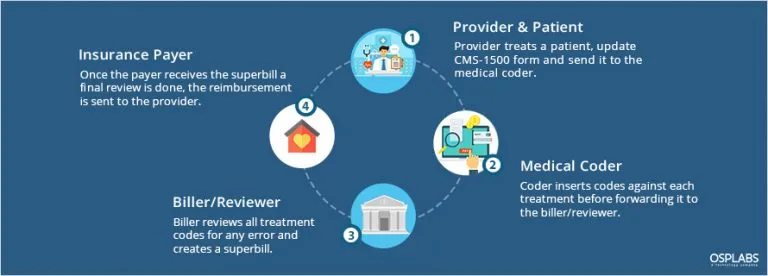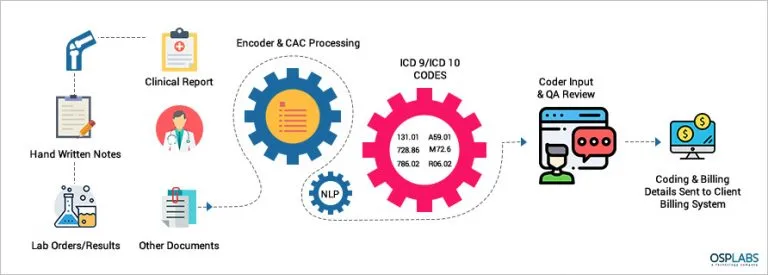

Rewriting of Medical Coding Automation using Artificial Intelligence
The importance of Artificial Intelligence is often understated and also overstating the same is quite difficult.. to get in-depth with how AI is actually bringing changes in MCA, we must get to the basics of what Medical Billing and Coding really are.
MEDICAL CODING
Medical coding, if we talk about it at a very basic level -- is something that a coder takes, a written piece if you may, and translates it as accurately as possible into a coded format such as numeric or alphanumeric code. The piece that's taken for translation can be something such as a prescription for medication or a doctor's diagnosis or something else medical related. A code for each and every event is created, these events can be of injuries, diagnosis or medical procedures.
Presently, there are about a hundred thousand codes existing that are used for medical procedures, outpatient procedures, and diagnoses. Let us have a look at a simple example of Medical Coding:
Let's say that a patient has walked into a doctor’s office and he/she is coughing tirelessly, they have a high production of mucus, and have a dreaded fever. Then a nurse walks up to the patient and asks them their symptoms, once the symptoms are noted, she performs some initial tests to get an idea of what is actually going on, and then comes the doctor who analyzes and concludes the diagnoses saying that the patient is suffering from bronchitis. A medication is then prescribed to the patient by the doctor.
Now comes the interesting part of Modern Healthcare, each and every part of the visit is recorded by the clinic be it the doctor or someone in the office who is authorized to carry out such operations. Then begins the coders job that is to translate all of relevant information of the visit into numeric and alphanumeric codes, which are ultimately used in the billing process.
The medical coder should be equipped with the knowledge of a few sets and subsets of code, let's take two of the subsets: International Classification of Diseases (ICD) these codes correspond to a patient’s injury or sickness, and Current Procedure Terminology (CPT) that are related to the functions and services Healthcare providers perform to the patient this can be as performing on them and performing for them.
A task included for the Medical Coders is to translate every bit of data or information of the patient's visit to the clinic and shape it in the form of a code. There are different codes for different kinds of visits, some codes are more specific these specific codes can be such as the patients symptoms, the tests performed by the doctor and the diagnosis procedure used by the doctor.
The Medical Coders have to keep these guidelines in mind, they are very important and can affect the status of a claim. The coding process concludes when the Medical Coder has entered the proper codes into the for or software program. This is where the job of the Medical Coder ends, now, all of this is passed on to the Medical Biller.
MEDICAL BILLING
The Medical Biller more so acts as a middleman between patients, healthcare providers and the insurance companies. Their job, is on similar lines in context to the Medical Coder. The Medical Biller translates the codes given by the Medical Coder into a financial report, they make sure that the Healthcare Provider has been reimbursed appropriately for the services they've provided.
Do not be fooled by the simplicity of the term "Medical Billing", it may seem that all the Medical Billers task is to make a bill (Commonly known as a 'Claim') for the insurance company by the help of the information provided by the Medical Coder, the reality of the process is not as simple.
Continuing with the previous example, the Medical Biller now looks at the codes, that consist of information of things such as the kind of visit, the symptoms, the diagnosis of the doctor, the medication prescribed by the doctor and then creates a Claim. The Claim is then sent and evaluated by the insurance company, and then returned back. The bill of the patient is then made by biller who carefully re-evaluates the returned claim after the insurance is removed, all of these tasks are performed through a form or software, they're called as Medical Billing Software Solutions and there's a large number of companies out there creating such solutions.
The biller takes a few factors into account such as the insurance plans of the patient into account while creating the bill, this ensures that an accurate bill is produced. In cases where the patient shows signs refraining the bill payment, the Medical Biller has to take appropriate steps to ensure healthcare provider is properly compensated.

Let's take a look at how a Traditional Medical Billing & Coding Process Flows:
Talking about the word 'Traditional' you must have got an idea that it requires ALOT of manual documentation and paper work, the average time for a traditional coding and billing process stretched on to about 5-7 weeks whereas in the modern automated system the process is reduced to as low as 2 weeks.
Following is a Claim-to-Payment Chase while using a traditional Paper-Based System.
- Patient visits the doctor’s office.
- Patient check-in, gets treated.
- Doctor or their assistant writes a superbill for the treatment.
- The Medical Coder writes codes for the treatment.
- Medical Billers receive Paper forms who then format the data and forward it to insurance payers.
- Payer generates check and send payment to the provider.
Now the point where AI fits into the story is to enhance the efficiency and efficacy of the billing and coding process. Computer Assisted Coding (CAC) is a technology that works on the concept of Machine Learning (ML) which is a branch of Artificial Intelligence (AI) and Natural Language Processing (NLP), they provide automated assistance to the rigorous task of identifying and extracting data from the given documents and inserting it into the system.




